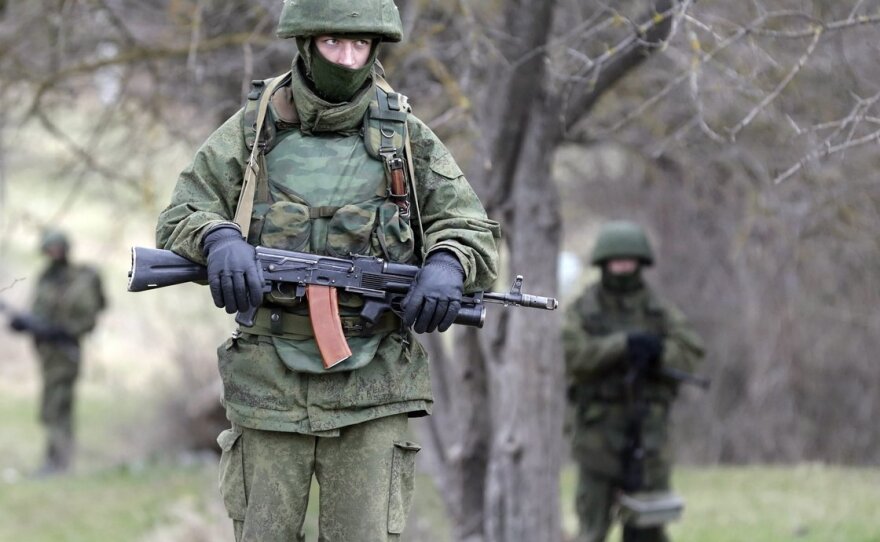As the tense standoff continues on the Crimean Peninsula, the focus of efforts to end the crisis peacefully shifts to Paris.
If all goes as diplomats hope, U.S. Secretary of State John Kerry and Russian Foreign Minister Sergey Lavrov will meet there later Wednesday. As NPR's Michele Kelemen said on Morning Edition, the stage is set for a very tense meeting.
Kerry's Tentative Schedule
— 11 a.m. ET (5 p.m. in Paris): "Meets with Russian Foreign Minister Sergey Lavrov."
— 12:45 p.m. ET (6:45 p.m. in Paris): "Holds a solo press availability."
On Tuesday, as we reported, Kerry and President Obama said Russia's explanation for its actions in Ukraine doesn't line up with reality.
Russian President Vladimir Putin "can throw a lot of words out there," Obama said, "but the facts on the ground" indicate that Russia is not acting in accordance with international principles about how to treat sovereign neighbors.
Kerry, who visited Kiev on Tuesday, said the U.S. condemns Russia's "act of aggression."
Putin said the soldiers who have surrounded Ukrainian military bases in Crimea and taken over key government installations are not Russian troops, but his statement flies in the face of what eyewitnesses and reporters such as NPR's Peter Kenyon, who is in Crimea, are seeing.
Kerry, who is meeting Wednesday with other diplomats from the nations that make up the permanent members of the U.N. Security Council, is expected to hold separate talks with Lavrov about the situation in Ukraine.
The U.S. and other Western nations hope Russia will take what's being called a diplomatic "off-ramp" — perhaps accepting the presence of international monitors in Crimea who would protect the interests of the region's ethnic Russian majority.
Earlier Wednesday in Madrid, where he has been meeting with Spanish officials, Lavrov said it's not up to Russia to decide whether international monitors should go to Crimea. That decision must be made by authorities in Ukraine and Crimea, which has enjoyed great autonomy for decades, he said.
From Madrid, correspondent Lauren Frayer tells our Newscast Desk that Lavrov also repeated Putin's claim that the troops in Crimea are "local self-defense forces" that don't answer to Moscow.
Also Wednesday, there was word from Brussels, Belgium, that European Union officials have agreed to provide Ukraine with a $15 billion package of loans and grants to shore up its economy, which has been crippled by the crisis.
We've previously summed up what set off months of protest in Kiev and ultimately led to Ukrainian President Viktor Yanukovych's dismissal by his nation's parliament last month:
"The protests were sparked in part by the president's rejection of a pending trade treaty with the European Union and his embrace of more aid from Russia. Protesters were also drawn into the streets to demonstrate against government corruption."
It was after Yanukovych left Kiev and headed for the Russian border that troops — Russian ones, according to witnesses, reporters and diplomats; "self-defense forces" according to Putin — moved to take control of strategic locations in Crimea. That peninsula is important to Russia not only because of the large ethnic Russian population, but also because it's home to Russia's strategically significant warm-water naval base on the Black Sea.
Update at 8:50 a.m. PT. Hagel Says U.S. Is Stepping Up Training With Poles:
"The Obama administration took steps Wednesday to support the defenses of U.S. allies in Europe in response to Russia's takeover of Ukraine's Crimean Peninsula," writes The Associated Press. "Testifying before the Senate Armed Services Committee, Defense Secretary Chuck Hagel said the U.S. was stepping up joint aviation training with Polish forces. The Pentagon also is increasing American participation in NATO's air policing mission in its Baltic countries, he said."





